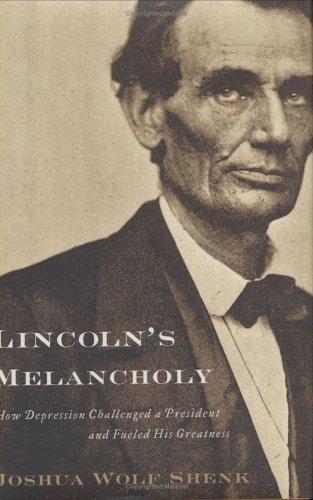368 pages
English language
Published Sept. 27, 2005 by Houghton Mifflin.
How Depression Challenged a President and Fueled His Greatness

368 pages
English language
Published Sept. 27, 2005 by Houghton Mifflin.
Drawing on seven years of his own research and the work of other esteemed Lincoln scholars, Shenk reveals how the sixteenth president harnessed his depression to fuel his astonishing success. Lincoln found the solace and tactics he needed to deal with the nation’s worst crisis in the �coping strategies” he had developed over a lifetime of persevering through depressive episodes and personal tragedies.
With empathy and authority gained from his own experience with depression, Shenk crafts a nuanced, revelatory account of Lincoln and his legacy. Based on careful, intrepid research, Lincoln’s Melancholy unveils a wholly new perspective on how our greatest president brought America through its greatest turmoil.
Shenk relates Lincoln’s symptoms, including mood swings and at least two major breakdowns, and offers compelling evidence of the evolution of his disease, from �major depression” in his twenties and thirties to �chronic depression” later on. Shenk reveals the treatments Lincoln endured …
Drawing on seven years of his own research and the work of other esteemed Lincoln scholars, Shenk reveals how the sixteenth president harnessed his depression to fuel his astonishing success. Lincoln found the solace and tactics he needed to deal with the nation’s worst crisis in the �coping strategies” he had developed over a lifetime of persevering through depressive episodes and personal tragedies.
With empathy and authority gained from his own experience with depression, Shenk crafts a nuanced, revelatory account of Lincoln and his legacy. Based on careful, intrepid research, Lincoln’s Melancholy unveils a wholly new perspective on how our greatest president brought America through its greatest turmoil.
Shenk relates Lincoln’s symptoms, including mood swings and at least two major breakdowns, and offers compelling evidence of the evolution of his disease, from �major depression” in his twenties and thirties to �chronic depression” later on. Shenk reveals the treatments Lincoln endured and his efforts to come to terms with his melancholy, including a poem he published on suicide and his unpublished writings on the value of personal—and national—suffering. By consciously shifting his goal away from personal contentment (which he realized he could not attain) and toward universal justice, Lincoln gained the strength and insight that he, and America, required to transcend profound darkness.